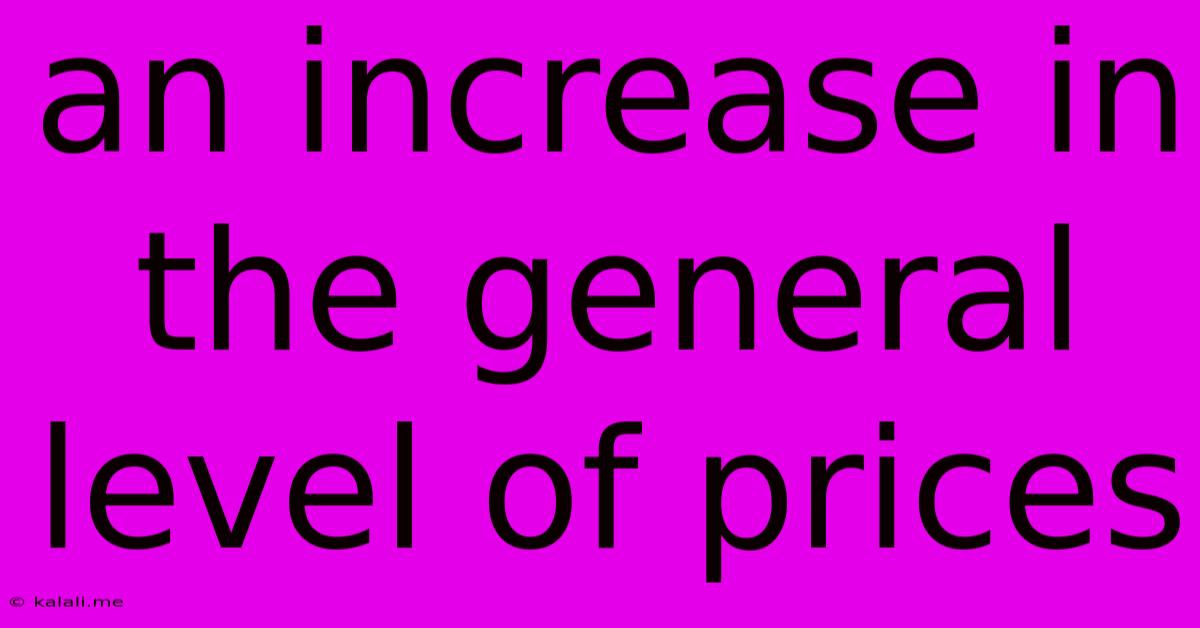An Increase In The General Level Of Prices
Kalali
Jun 14, 2025 · 3 min read

Table of Contents
Understanding Inflation: An Increase in the General Level of Prices
Inflation, simply put, is a sustained increase in the general price level of goods and services in an economy over a period of time. When the price level rises, each unit of currency buys fewer goods and services. Consequently, inflation reflects a reduction in the purchasing power per unit of money – a loss of real value in the medium of exchange and unit of account within the economy. This means your money buys less than it did before. This article will explore the causes, effects, and measurement of inflation.
Causes of Inflation
Several factors contribute to inflation, and they often interact in complex ways. Key drivers include:
-
Demand-Pull Inflation: This occurs when aggregate demand in an economy outpaces aggregate supply. Increased consumer spending, government spending, or investment can push prices higher as consumers compete for limited goods and services. Think of a sudden surge in demand for a specific product – its price will naturally increase.
-
Cost-Push Inflation: This type of inflation arises from increases in the cost of production. Rising wages, higher raw material prices (like oil or essential commodities), or increased taxes can all lead businesses to raise prices to maintain profitability. Supply chain disruptions can also significantly contribute to cost-push inflation.
-
Built-in Inflation: This is a self-perpetuating cycle where inflation becomes embedded in expectations. If workers anticipate higher prices, they'll demand higher wages, leading businesses to raise prices further. This creates a feedback loop that sustains inflation.
-
Monetary Inflation: Excessive growth in the money supply, often driven by government policies, can lead to inflation. When there's more money chasing the same amount of goods and services, prices inevitably rise. This is sometimes referred to as “too much money chasing too few goods.”
Effects of Inflation
Inflation, while sometimes a sign of a healthy economy, can have significant negative consequences if unchecked:
-
Reduced Purchasing Power: As prices rise, the purchasing power of consumers diminishes. This means people can afford less with the same amount of money, impacting their standard of living.
-
Uncertainty and Investment: High and unpredictable inflation creates uncertainty for businesses and investors. It makes planning difficult and can discourage long-term investments.
-
Income Redistribution: Inflation can disproportionately affect certain groups. Those on fixed incomes, such as retirees, are particularly vulnerable as their income doesn't keep pace with rising prices. Creditors also suffer as the real value of their loans decreases.
-
Increased Interest Rates: Central banks often respond to inflation by raising interest rates. This makes borrowing more expensive, potentially slowing economic growth.
Measuring Inflation
Inflation is typically measured using price indices, which track the average change in prices of a basket of goods and services over time. The most commonly used index is the Consumer Price Index (CPI), which measures the average change in prices paid by urban consumers for a basket of consumer goods and services. Other indices include the Producer Price Index (PPI), which tracks prices at the wholesale level, and the GDP deflator, which measures the overall price level of all goods and services produced in an economy.
Conclusion
Inflation is a multifaceted economic phenomenon with far-reaching consequences. Understanding its causes, effects, and measurement is crucial for policymakers, businesses, and individuals alike. Managing inflation effectively requires a balanced approach that considers monetary policy, fiscal policy, and structural reforms to ensure sustainable economic growth and price stability. While moderate inflation is often seen as manageable, high and unpredictable inflation can severely damage an economy's health and well-being.
Latest Posts
Latest Posts
-
Which Statement Describes How The Van Allen Belts Are Formed
Jun 14, 2025
-
Is The Peru Current Warm Or Cold
Jun 14, 2025
-
Specific Weight Of Water Kn M3
Jun 14, 2025
-
Who Is The Founder Of Yoga
Jun 14, 2025
-
What Has Mass And Occupies Space
Jun 14, 2025
Related Post
Thank you for visiting our website which covers about An Increase In The General Level Of Prices . We hope the information provided has been useful to you. Feel free to contact us if you have any questions or need further assistance. See you next time and don't miss to bookmark.